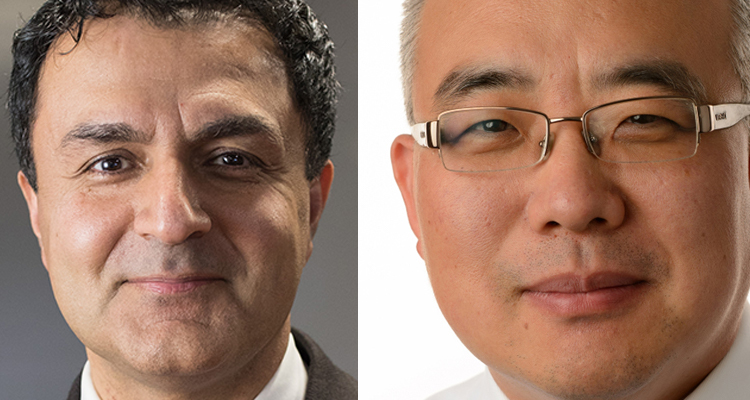
Projects in key research areas from energy storage and robotics to psychology have been awarded national grants.
UNSW Sydney researchers have received almost $13.5m from the Australian Research Council (ARC) for 11 projects in key research areas. These include the development of a revolutionary technology for storing renewable energy without the need for batteries, a study of the unique properties of liquid metals, and nine fellowships for the University’s brightest mid-career researchers.
The grants are part of the $180.4m in 2018 ARC program funding announced 2 August by Federal Minister for Education and Training Simon Birmingham.
Professor Zhao Yang (Joe) Dong from the School of Electrical Engineering and Telecommunications (pictured above, right, with Professor Kourosh Kalantar-zadeh) secured more than $3m under ARC’s Industrial Transformation Research Hubs (ITRH) for Integrated Energy Storage Solutions. The five-year project is expected to generate cheaper and more effective storage devices for renewable energy which will result in reducing carbon emissions and improving efficiency in the energy sector.
Recent SHARP hire Professor Kourosh Kalantar-zadeh, who joined the Faculty of Engineering in early August, received an Australian Laureate Fellowship. The award is considered among the most prestigious and contested in the research community. Professor Kalantar-zadeh will investigate the unique properties of liquid metals and explore their untapped potential.
In addition, ARC awarded more than $7.2m in Future Fellowships to nine of UNSW’s outstanding researchers in science, engineering, medicine and social sciences. The Future Fellowships scheme supports research in areas of critical national importance by giving outstanding researchers incentives to conduct their research in Australia.
Professor Nicholas Fisk, Deputy Vice Chancellor (Research) at UNSW, said: “Our robust results in the latest Future Fellowships round solidifies UNSW’s commitment to nurturing world-leading early and middle-career researchers whose work improves the lives of people in Australia and around the globe.”
Among the largest Future Fellowships announced was $953,217 to Associate Professor Kalervo Gulson from the School of Education, for a project investigating the use of artificial intelligence in education and the connection between education systems and technology companies.
Dr Danyang Wang from the School of Materials Science and Engineering received $873,125 to establish a bridge between the diverse electronic properties of oxides and the semiconductor platforms to generate new devices and functionalities.
Dr Kristopher Kilian, who holds a joint position in the schools of Chemistry and Materials Science and Engineering, received $870,125 for work in regenerative medicine, specifically reprogramming a patient’s cells to treat disease.
Dr Melissa Merritt from the School of Humanities and Languages received $850,525 for a project investigating how key ethical ideals from philosopher Immanuel Kant, such as human dignity, autonomy, cosmopolitanism and good will, emerged from ancient Stoic ethics.
Associate Professor Yvonne Wong from the School of Physics will use a $798,125 grant to explain the nature of dark matter and provide a solution to the so-called small-scale crisis.
Dr Lijun Chang from the School of Computer Science and Engineering, secured a $766,125 grant to study advanced cohesive subgraph searches, as well as design efficient and scalable techniques to conduct such searches. Cohesive searching over big graphs is demanded by many applications, such as risk management, cybersecurity, crime detection, social marketing and community search.
Dr Thanh Vinh Nguyen from the School of Chemistry received $739,125 for a project to develop synthetic applications of tropylium ions as versatile building blocks, to access a broad range of organic structures that used to be problematic to synthesise.
The Climate Change Research Centre’s Dr Laurie Menviel secured a $714,125 grant to study changes in ocean dynamics and biogeochemistry.
Dr Tjeerd Boonstra from the Black Dog Institute will use a $701,645 grant to study the structure and function of the human spinal connectome. This project will use complex network analysis to map the interactions between the brain and body, to understand how the central nervous system controls our movements.
- Log in to post comments
